|
|
|
Sort Order |
|
|
|
Items / Page
|
|
|
|
|
|
|
| Srl | Item |
| 1 |
ID:
145921
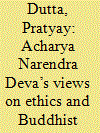

|
|
|
|
|
| Summary/Abstract |
Acharya Narendra Deva strongly believed that the Gandhian ideas based on morality and ethics could be the only solution to meet the basic needs of a society both developing and developed. He wielded the Gandhian weapon of satyagraha most effectively to fight every form of injustice against the oppressed and the depressed in the then Indian society. He remained a pathfinder of the socialist movement in India and felt that without political independence the socialist programme could never become a reality. The purpose of the article is to highlight the impact of ethics and Buddhism on Narendra Deva’s overall socio-political ideas and its relevance in the 21st century.
|
|
|
|
|
|
|
|
|
|
|
|
|
|
|
|
| 2 |
ID:
145918


|
|
|
|
|
| Summary/Abstract |
With the end of the Cold War the international scenario changed putting end to the erstwhile Cold War ‘brinkmanship’. It ushered in flexibility and openness. It soon became obvious that the neo-realist theory was not at all clear about the future developments of the ‘balance of power’. The older debates were replaced with two new debates: one between ‘rationalists’ and ‘constructivists’ and the other between ‘constructivists’ and ‘critical theorists’. Although some scholars opine that the historical context (the end of Cold War) and the theoretical discussion among IR scholars set the stage for a constructivist approach, it would be more correct to argue that the catalyst for this shift in the axes of debate was the rise of a new constructivist approach to international relations theory.3 This approach challenged the rationalism and positivism of neo-realism and neo-liberalism while simultaneously pushing critical theorists away from meta-theoretical critique to the empirical analysis of world politics.
|
|
|
|
|
|
|
|
|
|
|
|
|
|
|
|
| 3 |
ID:
145915
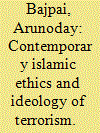

|
|
|
|
|
| Summary/Abstract |
The term 'ethics' is derived from the ancient Greek word 'ethikos', which is derived from 'ethos' meaning custom or habit. As such ethics has two meanings. First, it refers to as set of moral principles which guide the human conduct and behaviour in different situations. These principles determine the right and wrong of human conduct. Second, ethics is a branch of philosophy, which is concerned with the systematic study of moral principles. The ethics as a code of conduct for various human activities and vocations, change, evolve and adjust with changing conditions. The Greek thinkers had sanctioned slavery, which continued for many centuries, however, it is unthinkable in the contemporary world. As new fields of human activities emerge, which require distinctive management and regulations, the new codes of ethics also evolved. Thus, now we have medical ethics, environmental ethics or business ethics and so on.
|
|
|
|
|
|
|
|
|
|
|
|
|
|
|
|
| 4 |
ID:
145909
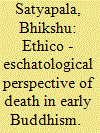

|
|
|
|
|
| Summary/Abstract |
The title of this paper as it suggests, mainly aims to deal with an important issue of human life i.e., death which has been in the focus from the centuries in philosophical circles though it is still an unresolved mystery obfuscating the human mind. The famous scripture Bhagavadgðta thus runs untiringly, “just as an embodied soul attains childhood, youth and old age through the body, so it attains another body after death. This Self is never born, nor dies ......”. This view of death subsumes the existence of the soul firstly and eternality of the same secondly. However, all religions of the world barring a few like Buddhism, do not describe the death as a horrified and unpleasant dagger hung over the humanity, rather they interpret death as an inevitable phenomenon that does not disturb a being’s existence. Accordingly different theories sneaked through the ever - long and endless speculations over the centuries, but to no avail. Regardless of it the misery of death continues its sway over humanity.
|
|
|
|
|
|
|
|
|
|
|
|
|
|
|
|
| 5 |
ID:
145917
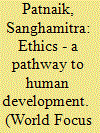

|
|
|
|
|
| Summary/Abstract |
Human Development revolves around three key words – capability, growth and participation. It believes in widening human capabilities through the development of human resources. It also implies that the benefits of growth must be translated into the lives of people. It emphasizes that people must be able to participate actively in influencing the processes that shape their lives. Thus, participation of the people in the decision-making process ensures empowerment and growth. Power according to Gandhiji gets expanded when it is shared with others. The base of his ethics of power is very much dependent on who exercises it. Here, power is derived from the people and should be used for people’s welfare.
|
|
|
|
|
|
|
|
|
|
|
|
|
|
|
|
| 6 |
ID:
145920
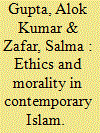

|
|
|
|
|
| Summary/Abstract |
Scientific temperament and technology has made deep inroads into life of human beings in twenty-first century. Human beings are adopting scientific values with the passage of time. Contemporary world is more willing to believe in scientific acts based on logical reasoning. The growth in scientific temperament among individuals has severely undermined the role of religion in life of individual and society. On the one hand religion demands unquestionable obligation of human beings and on the other hand, people still continues to believe in “luck or Kismat”. Large numbers of people despite of their scientific values continue to believe in the power of unseen forces. So, there still continues to be an overlapping between science and religion and the values attached to it.
|
|
|
|
|
|
|
|
|
|
|
|
|
|
|
|
| 7 |
ID:
145919
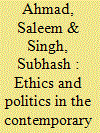

|
|
|
|
|
| Summary/Abstract |
Almost thirteen years after the invasion of Iraq, it teaches several ethical lessons about war as an instrument of the US foreign policy. First, and foremost, the Iraq war reminds us of the folly and immorality of pre-emptive war. The Bush administration attempted to exercise its “entitlement to meddle…to demonstrate its capacity to impose its will on its designated adversaries” by invading Iraq. President Bush’s efforts to exercise his “entitlement to meddle” backfired when it gave birth to an intractable insurgency against the American occupation forces and an ongoing civil war in Iraq. Second, the Iraq war offers an object lesson on the limits of imperial might.
|
|
|
|
|
|
|
|
|
|
|
|
|
|
|
|
| 8 |
ID:
145894


|
|
|
|
|
| Summary/Abstract |
The Second Separate Edict is a training module for our foreign policy analysts and diplomats. The Emperor assures his neighbouring countries that his intention is not that they should suffer because of him. Rather they ‘should trust in him, and should have in their dealings with him only happiness and no sorrow. They should understand that the king will forgive them as far as they can be forgiven, and that through him they should follow Dhamma and gain this world and the next.' Surely, this was a nice way to take the unconquered territories into confidence and to reassure them as the monarch had a vast standing army to safeguard his people and domain. This would definitely have made his neighbours nervous. However, the method through which the policy of Dhamma was able to spread far and wide by Ashoka was not due to vast army but because his leadership had gems like vision, conviction, cooperation, peace, persuasion, harmony, mutual benefit, faith and truth. The very same qualities which separate legends from the ordinary men and the limited sectarian beliefs from the teaching of Buddha, which is Dhamma.
|
|
|
|
|
|
|
|
|
|
|
|
|
|
|
|
| 9 |
ID:
145907
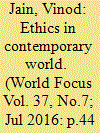

|
|
|
|
|
| Summary/Abstract |
Ethics took shape in two different ways. One, in ancient times, when humans in order to understand environment started asking questions and kept trying to answer them by arguments and conjecture. This took them to what we now know as the religious path. In those earlier times religion suggested how human society began. At that time laws governing human behaviour were made in the name of God. At that time the concept of morality also went in the name of God. Two, in recent times, that is, during the last few hundred years, development of science based knowledge in a vast variety of fields developed a scientific world view. This world view was not based on opinions based on limited knowledge. This was based on knowledge that was huge, was verifiable and was expanding.
|
|
|
|
|
|
|
|
|
|
|
|
|
|
|
|
| 10 |
ID:
145911


|
|
|
|
|
| Summary/Abstract |
Material progress of the society has not brought about an improvement in the quality of society in terms of right living and right thinking. As we raise our concern about the declining standards of values system in the society and realize that upliftment of any society depends on how ethical are the standards of behavior, we come to the conclusion that restoring values is an urgency as well as an emergency. But the biggest difficulty is in drawing the line between ethical and unethical given the growing preponderance of self-interest over all other interests. Definition notwithstanding, the one important way out is looking at the life and times of benchmarks in the form of personalities and characters who have lived life ethically and conducted themselves righteously. The present article discuss these issues in detail.
|
|
|
|
|
|
|
|
|
|
|
|
|
|
|
|
| 11 |
ID:
145895
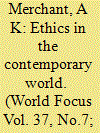

|
|
|
|
|
| Summary/Abstract |
Looking at the world conditions in the age of globalization the author provides powerful insights into the causes of a near bankruptcy of ethics and morality both in private dealings and the public spaces. He draws great inspiration from the Teachings of Bahá’u’lláh, founder of the Bahá'í Faith, in providing the remedial measures that are pertinent and sorely needed for recovery of our civilizational ethos. Although the nations of the world are committed to upholding the United Nations Convention against Corruption adopted in 2003 yet the ground reality is just the opposite. With every passing day the complexity of world situation is becoming more and more difficult to fathom. In different nations in different ways, the social consensus around ideals that have traditionally united and bound together the society appears to be worn and spent. One explanation offered is that religion or dharma which provided the foundational framework for ethics and morality both in private and public life have grossly eroded in today’s world. Restoration of the powerful motivating force of dharma or religion would infuse every sincere follower with the highest ethical precepts for the betterment of societies and lasting peace in the world, the article persuasively advocates.
|
|
|
|
|
|
|
|
|
|
|
|
|
|
|
|
| 12 |
ID:
145890
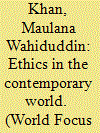

|
|
|
|
|
| Summary/Abstract |
According to my study, all the religions have two different aspects to them – theology and the moral scheme. Theology means the set of beliefs or doctrinal base of a religion, in other words, the inner contents of a religion. In terms of theology, there are differences between religions. For example, some religions have the monistic concept of God, while other religions believe in the monotheistic concept of God. Differences of this kind have always been the subject of discussion among theologians and no doubt, they will continue to be so in the future. But like other intellectual discussions about differences, they are basically confined to scholars, having nothing to do with the common people. Common people can live their daily lives without concerning themselves with or even without knowing about these issues. These issues are concern of a few individuals and not of the masses of any society.
|
|
|
|
|
|
|
|
|
|
|
|
|
|
|
|
| 13 |
ID:
145892
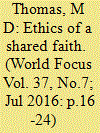

|
|
|
|
|
| Summary/Abstract |
Taking into consideration the lives of human beings, what is the raison de'tre of faith? Can faith or religion ever be a cloistered phenomenon? If not, what are its social characteristics and interfaith implications? Does it have any essential linkage with ethics and if yes, what are the ethical imperatives of a shared faith? In fact, the root meanings of the words 'faith and religion' suggest a perception of life that is necessarily dynamic and relational. They are loaded with a wide range of in-depth implications. They aren't merely pious ideas that may or may not have any bearing on one's life. They are in effect ethical directives that are oriented to motivate and empower believers, in favour of scaling higher and larger degrees and dimensions of life.
|
|
|
|
|
|
|
|
|
|
|
|
|
|
|
|
| 14 |
ID:
145922


|
|
|
|
|
| Summary/Abstract |
Market based mechanisms under the United Nations Framework Convention on Climate Change (UNFCCC) have gone on from according flexibility to becoming one of the main tools for mitigation action. In December 2015 at Conference of Parties-21, governments of the world came together to decide on the post-2020 Architecture For Multi-lateral action towards combating climate change by reaching an agreement by submitting their intended nationally determined contributions (INDC’s).
|
|
|
|
|
|
|
|
|
|
|
|
|
|
|
|
| 15 |
ID:
145891
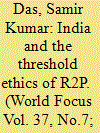

|
|
|
|
|
| Summary/Abstract |
India’s foreign policy in the post-Cold War period has become a subject of one of the most acrimonious debates in her recent past history. While it is often denigrated as ‘firefighting’, ‘ad hocism’ and ‘drift’, many other commentators propose to interpret it as one driven by realpolitik interests paying scant regard to her ideological and ethical commitments. Never before in her history has Indian foreign policy faced such an ethical crisis as it is facing now.
|
|
|
|
|
|
|
|
|
|
|
|
|
|
|
|
| 16 |
ID:
145910
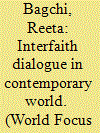

|
|
|
|
|
| Summary/Abstract |
On entering into a new millennium it is realized that the world we live in and the world that the coming generation will inherit are challenging and different from the past. Rapid advancement in the area of Science and technology has transformed society by transcending narrow grooves of thought. Advancement in transport system, information and communication technology has witnessed unprecedented activity on trade and economic front breaking all barriers between countries. The whole world has turned to a small village and global community of aspirations and endeavors resulting in the evolution of a universal culture and civilization which has brought diverse religious and cultural groups together in every country.
|
|
|
|
|
|
|
|
|
|
|
|
|
|
|
|
| 17 |
ID:
145893
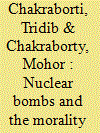

|
|
|
|
|
| Summary/Abstract |
The atomic bombing of Hiroshima and Nagasaki, led by the US in August 1945, remains the most brutal insignia of the Second World War. Seventy-one years after this incident, the recent visit of the US President, Barack Obama to the Hiroshima War Memorial has resurrected several issues related to the apocalyptic bombings, foremost among which is the question of a pending apology by the perpetrators of this ‘crime against humanity’. The devastating consequences of the use of nuclear weapons in war cannot be justified on moral grounds, in keeping with which, the International People’s Tribunal (2007) has declared the twin bombings as both a ‘war crime’ and a ‘crime against humanity’. Although President Obama espouses a world free of nuclear weapons, their complete elimination seems too far-fetched and utopian, at least in the short-term. Fortunately, the existence of mechanisms to prevent non-proliferation could contribute towards checking the increase in nuclear stockpiles and facilitate steps towards greater international peace and security.
|
|
|
|
|
|
|
|
|
|
|
|
|
|
|
|
| 18 |
ID:
145914


|
|
|
|
|
| Summary/Abstract |
World today is sitting on powder-keg. Globe has been reduced to a zone of chaos. Globe, as mirror of problems, ceases to be a cosmos. Problems are writ large as corruption, terrorism, cold war, hot war, indiscriminate killing, greed, global warming, environmental degradation, and climate change to name but a few. These manifold and multi-level challenges cannot be resolved through policy interventions as they are largely artificial and consequences of human fallibility. Geometrical growth in population and consequent depletion of resources have caused resource crunch, prompting men to interfere with nature that left nothing that we eat and use as natural.
|
|
|
|
|
|
|
|
|
|
|
|
|
|
|
|
| 19 |
ID:
145923


|
|
|
|
|
| Summary/Abstract |
Moral cosmopolitanism workswhen all the actors are collectively motivated and act accordingto those principles. Similarly, regionalism, a process to instigate economic, social and political cooperation among a group of sovereign state, essentializes concertedcommitment and effort towards integration.Yet, for both cosmopolitanism and regionalismto manifest, the role of national interest and ambition cannot be ignored. The article considers two of such ambitions of asovereign state- economic and strategic. It argues that in each case, when the national interest and ambitionof the member states of a regional organization is harnessed, the cosmopolitan ideal of regional peace and securitywill also berealized.
|
|
|
|
|
|
|
|
|
|
|
|
|
|
|
|
| 20 |
ID:
145916
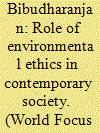

|
|
|
|
|
| Summary/Abstract |
Ethics is an axiological theory. It is the science of values. It deals with norms or standards to evaluate human conduct. Let me make it clear that moral philosophising and application of moral standards is not limited to philosophers. Every human being philosophises about values. Everyone uses moral theories. Philosophy, however, is the only discipline engaged in the study of moral theories as one of its subject. Philosophers attempt to justify the theories they propose. The problem of philosophising arises quite naturally when anyone begins to reflect upon his or her moral practices questioning the justification of actions. Ethics has a practical purpose. Knowledge of moral practice must not be conceived as a purely theoretical knowledge of moral phenomena, but as practical knowledge about how we ought to live. The philosopher is called upon to give a blue print of becoming good in different stations of life. This is called applied ethics.
|
|
|
|
|
|
|
|
|
|
|
|
|
|
|
|
|
|
|
|
|